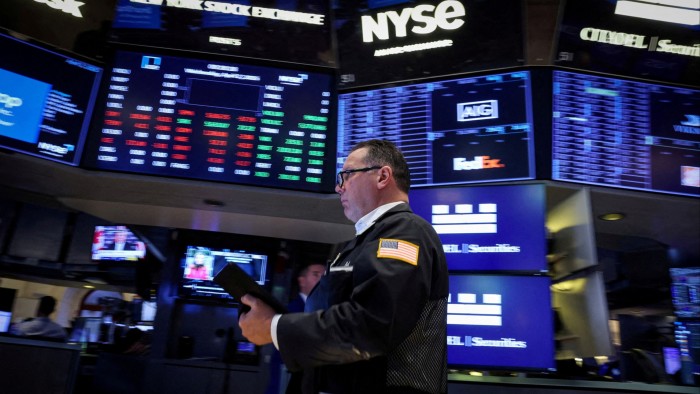Share this @internewscast.com
Unlock the White House Watch newsletter for free
The market rout triggered by Donald Trump’s tariffs deepened on Monday after the US president signalled he would not back down from his aggressive trade policies despite growing fears of a global recession.
Equities fell heavily, haven currencies rose and bond yields declined. Ahead of the US market open, contracts tracking the blue-chip S&P 500 were down 2.4 per cent, while those for the Nasdaq fell 2.8 per cent.
Asian shares were pummelled, with Hong Kong’s Hang Seng index down more than 13 per cent, its worst single-day fall this century.
European stocks tumbled, with the Stoxx Europe 600 index sinking 4.7 per cent, while Germany’s Dax was 4.2 per cent lower, having briefly plunged more than 10 per cent at the open. The FTSE 100 was down 4.5 per cent.
The heavy falls came as Goldman Sachs raised the probability of a US recession from 35 per cent to 45 per cent following “a sharp tightening in financial conditions” after Trump imposed sweeping levies on US trading partners last week.
On Monday, Trump reiterated a warning for countries “abusing” the US not to retaliate to his tariffs. In a post on his Truth Social network, he claimed such countries had been “taking advantage of the Good OL’ USA” for decades.
Asked about the market falls on Sunday, Trump told reporters that “sometimes you have to take medicine to fix something”.
The US president upended the global trade order on what he dubbed “liberation day” last week by imposing duties of more than 40 per cent on some of America’s biggest trading partners, prompting China to announce retaliatory duties of 34 per cent.
Trump’s defiant comments prompted traders in futures markets on Monday to raise bets on rate cuts from the Federal Reserve, pricing in either four or five quarter-percentage point reductions by December, up from four on Friday.
As markets tumbled, prominent Wall Street figures began to raise the alarm about the economic risks of Trump’s tariffs.
In his annual letter to shareholders on Monday, JPMorgan Chase chief Jamie Dimon warned that a global trade war risked tipping the US economy into a recession and driving prices higher.
On Sunday, billionaire investor Bill Ackman, who has endorsed Trump, warned on X that the US president’s tariffs risked plunging the US into a “self-induced, economic nuclear winter”.
Ackman also attacked commerce secretary Howard Lutnick as “indifferent to the stock market and economy crashing”, claiming that Lutnick and his firm Cantor Fitzgerald had made money through their ownership of fixed-income assets.
Haven bonds, such as US Treasuries, had soared in price during the equity slump of the past few days. Lutnick “profits when our economy implodes”, Ackman said.
Billionaire hedge fund investor Stanley Druckenmiller also expressed opposition to Trump’s trade policy, writing on X: “I do not support tariffs exceeding 10 per cent.”
The benchmark 10-year US Treasury yield, closely watched by Trump administration officials, was down 0.01 percentage points at 3.98 per cent.
Japan’s 10-year yield fell 0.07 percentage points to 1.11 per cent, while Germany’s 10-year yield fell 0.07 percentage points to 2.55 per cent.
“Investors are closing down a lot of positions in light of the volatility,” said Jason Lui, head of Asia-Pacific equity and derivative strategy at BNP Paribas. “[The falls are] a reflection of some of the positioning unwind, especially the foreign positioning in Japanese banks and financials.”
Commodities sustained heavy losses, with West Texas Intermediate, the US oil price benchmark, falling 2.4 per cent to $60.52 a barrel. International benchmark Brent crude dropped 2.1 per cent to $64.18.
Bitcoin fell 2.7 per cent to $76,691 a token.
The US dollar was steady against a basket of peers. Chinese authorities set the onshore renminbi at its weakest level since early December at Rmb7.19 a dollar.
On Sunday, Treasury secretary Scott Bessent dismissed the “short-term” market reaction to the president’s aggressive tariffs, telling NBC that the White House would “hold the course”.
Asked whether Trump’s tariffs were negotiable, he said: “We’re going to have to see what [other] countries offer and whether it’s believable.”
Additional reporting by Haohsiang Ko in Hong Kong












